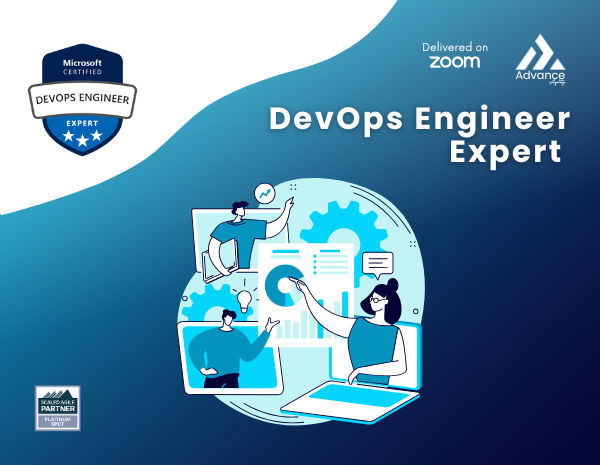Register today and get 10% off on all courses
Coupon Code: DIS10*
Register today and get 10% off on all courses
Coupon Code: DIS10*


The AZ-400T00: Designing and Implementing Microsoft DevOps Solutions course equips professionals with the skills to create and manage DevOps processes in Microsoft Azure.
Date
09 Feb - 12 Feb (Mon-Thu)
Time
10:00 AM - 6:00 PM (EST)
$1,050
10% OFF
$950
Trusted by organizations worldwide for professional development. Advance Agility connects clients with experienced trainers and global peers.









+
+
+
This course provides hands-on training for IT professionals to design, implement, and manage DevOps practices using Microsoft Azure. Covering topics like CI/CD pipelines, infrastructure as code, security, monitoring, and automation with tools such as Azure DevOps, Docker, Kubernetes, and Terraform, it prepares participants to streamline software delivery and improve collaboration between development and operations teams.
• Introduction to DevOps
• Understand what DevOps is and the steps to accomplish it
• Identify teams to implement the process
• Plan for the transformation with shared goals and timelines
• Plan and define timelines for goals
• Plan Agile with GitHub Projects and Azure Boards
• Describe GitHub Projects and Azure Boards
• Link Azure Boards and GitHub
• Configure and Manage GitHub Projects and boards
• Customize Project views
• Design and implement branch strategies and workflows
• Describe Git branching workflows
• Implement feature branches
• Implement GitHub Flow
• Fork a repo
• Collaborate with pull requests in Azure Repos
• Leverages pull requests for collaboration and code reviews
• Give feedback using pull requests
• Configure branch policies
• Use GitHub mobile for pull requests approvals
• Explore Git hooks
• Understand Git hooks
• Identify when used Git hooks
• Implement Git hooks for automation
• Explain Git hooks' behavior
• Plan foster inner source
• Use Git to foster inner source across the organization
• Implement fork workflow
• Choose between branches and forks
• Share code between forks
• Manage and configure repositories
• Understand large Git repositories
• Explain VFS for Git
• Use Git Large File Storage (LFS)
• Purge repository data
• Manage and Automate Release Notes with GitHub
• Identify technical debt
• Identify and manage technical debt
• Integrate code quality tools
• Plan code reviews
• Describe complexity and quality metrics
• Explore Azure Pipelines
• Describe Azure Pipelines
• Explain the role of Azure Pipelines and its components
• Decide Pipeline automation responsibility
• Understand Azure Pipeline key terms
• Manage Azure Pipeline agents and pools
• Choose between Microsoft-hosted and self-hosted agents
• Install and configure Azure Pipelines Agents
• Configure agent pools
• Make the agents and pools secure
• Explore communication to deploy using Azure Pipelines
• Describe pipelines and concurrency
• Use and estimate parallel jobs
• Use Azure Pipelines for open-source or private projects
• Use Visual Designer
• Work with Azure Pipelines and YAML
• Design and implement a pipeline strategy
• Define a build strategy
• Explain and configure demands
• Implement multi-agent builds
• Use different source control types available in Azure Pipelines
• Integrate with Azure Pipelines
• Describe advanced Azure Pipelines anatomy and structure
• Detail templates and YAML resources
• Implement and use multiple repositories
• Introduction to GitHub Actions
• Explain GitHub Actions and workflows
• Create and work with GitHub Actions and Work
• Describe Events, Jobs and Runners
• Examine output and release management for actions
• Learn continuous integration with GitHub Actions
• Implement Continuous Integration with GitHub Actions
• Use environment variables
• Share artifacts between jobs and use Git tags
• Create and manage secrets
• Design a container build strategy
• Design a container strategy
• Work with Docker Containers
• Create an Azure Container Registry
• Explain Docker microservices and containers
• Create a release pipeline
• Explain the terminology used in Azure DevOps and other Release Management Tooling
• Describe what a Build and Release task is, what it can do, and some available deployment tasks
• Implement release jobs
• Explore release recommendations
• Explain things to consider when designing your release strategy
• Define the components of a release pipeline and use artifact sources
• Create a release approval plan
• Implement release gates
• Provision and test environments
• Provision and configure target environment
• Deploy to an environment securely using a service connection
• Configure functional test automation and run availability tests
• Setup test infrastructure
• Manage and modularize tasks and templates
• Use and manage task and variable groups
• Use release variables and stage variables in your release pipeline
• Use variables in release pipelines
• Automate inspection of health
• Implement automated inspection of health
• Create and configure events
• Configure notifications in Azure DevOps and GitHub
• Create service hooks to monitor pipeline
• Classify a release versus a release process, and outline how to control the quality of both
• Choose a release management tool
• Introduction to deployment patterns
• Describe deployment patterns
• Explain microservices architecture
• Understand classical and modern deployment patterns
• Plan and design your architecture
• Implement blue-green deployment and feature toggles
• Explain deployment strategies
• Implement blue green deployment
• Understand deployment slots
• Implement and manage feature toggles
• Implement canary releases and dark launching
• Describe deployment strategies
• Implement canary release
• Explain traffic manager
• Understand dark launching
• Implement A/B testing and progressive exposure deployment
• Implement progressive exposure deployment
• Implement A/B testing
• Implement CI/CD with deployment rings
• Identify the best deployment strategy
• Integrate with identity management systems
• Integrate Azure DevOps with identity management systems
• Integrate GitHub with single sign-on (SSO)
• Understand and create a service principal
• Create managed service identities
• Manage application configuration data
• Rethink application configuration data
• Understand separation of concerns
• Integrate Azure Key Vault with Azure Pipelines
• Manage secrets, tokens and certificates
• Describe Azure App Configuration
• Understand Key-value pairs
• Understand app configuration feature management
• Implement application configuration
• Explore infrastructure as code and configuration management
• Understand how to deploy your environment
• Plan your environment configuration
• Choose between imperative versus declarative configuration
• Explain idempotent configuration
• Create Azure resources using Azure Resource Manager templates
• Create Azure resources using Azure Resource Manager templates
• Understand Azure Resource Manager templates and template components
• Manage dependencies and secrets in templates
• Organize and modularize templates
• Create Azure resources by using Azure CLI
• Create Azure resources using Azure CLI
• Understand and work with Azure CLI
• Run templates using Azure CLI
• Explains Azure CLI commands
• Explore Azure Automation with DevOps
• Implement automation with Azure DevOps
• Create and manage runbooks
• Create webhooks
• Create and run a workflow runbook and PowerShell workflows
• Plan for hybrid management
• Implement Desired State Configuration (DSC)
• Implement Desired State Configuration (DSC)
• Describe Azure Automation State Configuration
• Implement DSC and Linux Automation on Azure
• Plan for hybrid management
• Implement Bicep
• Learn what Bicep is
• Learn how to install it and create a smooth authoring experience
• Use Bicep to deploy resources to Azure
• Deploy Bicep files in Cloud Shell and Visual Studio Code
• Introduction to Secure DevOps
• Identify SQL injection attack
• Understand DevSecOps
• Implement pipeline security
• Understand threat modeling
• Implement open-source software
• Implement open-source software
• Explain corporate concerns for open-source components
• Describe open-source licenses
• Understand the license implications and ratings
• Software Composition Analysis
• Inspect and validate code bases for compliance
• Integrate security tools like WhiteSource with Azure DevOps
• Implement pipeline security validation
• Interpret alerts from scanning tools
• Configure GitHub Dependabot alerts and security
• Security Monitoring and Governance
• Configure Microsoft Defender for Cloud
• Understand Azure policies
• Describe initiatives, resource locks and Azure Blueprints
• Work with Microsoft Defender for Identity
• Explore package dependencies
• Define dependency management strategy
• Identify dependencies
• Describe elements and componentization of a dependency management
• Scan your codebase for dependencies
• Understand package management
• Implement package management
• Manage package feed
• Consume and create packages
• Publish packages
• Migrate consolidate and secure artifacts
• Identify artifact repositories
• Migrate and integrate artifact repositories
• Secure package feeds
• Understand roles, permissions and authentication
• Implement a versioning strategy
• Promote packages
• Push packages from pipeline
• Describe semantic and explore best practices for versioning
• Implement a versioning strategy
• Introduction to GitHub Packages
• Publish packages
• Install packages
• Delete and restore packages
• Configure access control and visibility
• Implement tools to track usage and flow
• Implement tools to track feedback
• Plan for continuous monitoring
• Implement Application Insights
• Use Kusto Query Language (KQL)
• Develop monitor and status dashboards
• Configure Azure Dashboards
• Work with View Designer in Azure Monitor
• Create Azure Monitor Workbooks
• Monitor with Power BI
• Share knowledge within teams
• Share knowledge with development teams
• Work with Azure DevOps Wikis
• Integrate with Azure Boards
• Design processes to automate application analytics
• Automate application analytics
• Assist DevOps with rapid responses and augmented search
• Integrate telemetry
• Implement monitoring tools and technologies
• Manage alerts, blameless retrospectives and a just culture
• Carry out blameless retrospectives and create a just culture
• Improve application performance
• Explain server response time degradation
• Reduce meaningless and nonactionable alerts
• Validate lab environment
• Agile planning and portfolio management with Azure Boards
• Version Control with Git in Azure Repos
• Configure agent pools and understand pipeline styles
• Enable Continuous Integration with Azure Pipelines
• Implement GitHub Actions for CI/CD
• Deploy Docker containers to Azure App Service web apps
• Configure Pipelines as Code with YAML
• Control Deployments using Release Gates
• Set up and run functional tests
• Integrate Azure Key Vault with Azure DevOps
• Enable Dynamic Configuration and Feature Flags
• Deployments using Azure Bicep templates
• Package Management with Azure Artifacts
• Monitor Application Performance with Azure Load Testing
• Share team knowledge using Azure Project Wiki


Lean Business Leadership and AI Coach
-1733912542.png)
Director of Agile Product Delivery & Transformation Coach

Business Agility and Transformation Coach
Get professional
guidance
from
learning
advisors

Upskill and reskill your team with our corporate training programs.
Reach Us

After completing the AZ-400T00 course, you can further enhance your skills by pursuing advanced courses that integrate AI into DevOps practices, equipping you for modern architecture such as:
• AI+ Architect™.
The AZ 400 or Azure DevOps training helps you learn multiple aspects, including DevOps planning, implementation of continuous integration, Source Control, consolidate Artifacts, designing a dependency management strategy, implementing continuous integration with Azure pipelines, managing application config, and secrets. It covers managing code quality and security policies and implementing a container build strategy.
Yes. The AZ 400 labs provide hands-on Azure DevOps training that helps you configure and implement various DevOps processes relevant to the course objectives.
The AZ 400 Designing and Implementing Microsoft Azure DevOps training will be provided by Microsoft Certified Trainers (MCTs) with extensive domain knowledge and over a decade of training experience.
Undertaking the AZ 400 Azure DevOps training program can help you prepare for the AZ-400 exam, which upon successfully clearing, you can earn the
Microsoft Certified Azure DevOps Engineer Expert Certification.
AZ-400 course completion enables the holder to get job opportunities in any industry. In general, some of the most represented industries are IT, Finance and Banking, Healthcare, Telcos, E-commerce, Consulting Services, Education Technology, Manufacturing, Retail, Media and Entertainment.
Instructors for the Microsoft DevOps Solutions training are experienced professionals who have extensive knowledge in the best practices of Azure DevOps. They are chosen on the basis of their expertise, industry experience, and teaching capabilities to provide quality training.